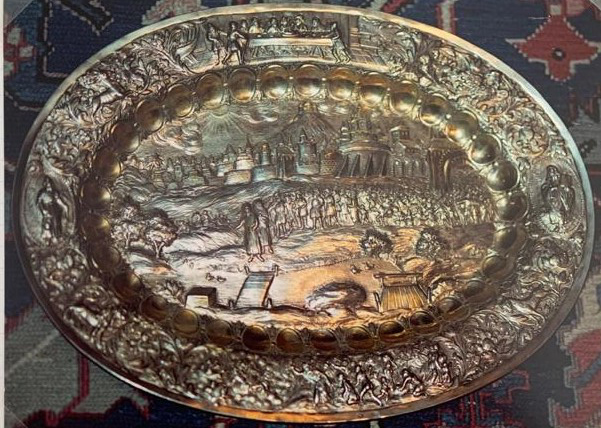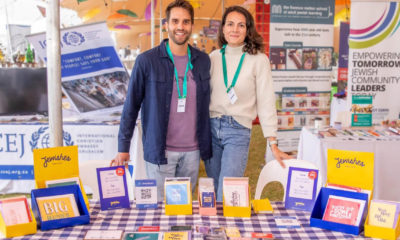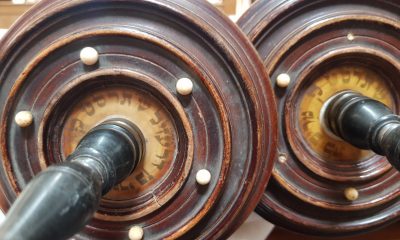
Featured Item

Judaica collectors preserve history in their homes
Some of South Africa’s most captivating Judaica is found in people’s homes.
From kiddush cups rescued from rubbish heaps to pre-Holocaust pieces found in pawn shops, the items collected by private individuals in our community illustrate the history of the Jewish people and their survival against all odds.
Candlesticks, tzedakah boxes, Channukiot, kiddush cups, and seder plates are just some of the items which have been preserved by members of the Johannesburg and Cape Town Jewish communities.
Although their history is often shrouded in mystery, their evident historical value makes them invaluable to those who own them.
“I’m not an intellectual collector of Judaica,” says David Sussman, a retired businessman and Killarney resident. “I don’t collect it for art reasons. For me, it’s about having these things in Jewish hands.”
Sussman began collecting Judaica in 1996 after successfully smuggling a Torah scroll out of Poland, having bought it off an elderly Polish Catholic. Through a business operating out of the city, Sussman arranged for an associate of his to scour local markets for Judaica, buying numerous items and returning them to South Africa.
“He would go to flea markets or hear from people about others who had them,” says Sussman. “He found countless items between 1996 and 1999, and after that, my wife and I used to pick up different items on our travels.”
Among these are a battered siddur purchased at a junk store in Budapest, an enormous seder plate made in Nuremberg in the 1800s, and handmade tzedakah boxes from the Prague ghetto. There’s even a book whose inner cover indicates that it was the property of the water carriers at the shul of Minsk.
Says Sussman, “It became a meshugas. Why should non-Jews have these things? They mean very little to them. Whenever I came across the stuff, I bought it.”
One of Sussman’s most prized items is a small handmade steel box, topped with an Iron Cross medal, and bearing the words “Sobibor, 1943, Shaul” punched out of its side with a sharp instrument.
“In financial terms, it’s worth nothing, but to me, it’s priceless,” says Sussman. “Shaul must have been a slave at the camp who was instructed to make it for a Nazi officer who provided the medal. To me, this is a remarkable piece.”
Ninety-five percent of Sussman’s collection predates the Holocaust, and he believes it adds a unique dimension to his home.
“None of this is here because of its monetary value,” he says. “It adds a certain peace to my home. I feel the neshomas of the Jews who owned them across the centuries around me.”
An equally enthusiastic collector is Johnny Egdes, whose Glenhazel home is a veritable repository of incredible pieces often found in the least likely of places: the city dump.
“I probably visit the dump every day of the week,” says Egdes. “So often, I’ve come across incredible pieces that people have just tossed out without realising exactly what it is they are throwing away.”
These items include not only pieces of antique furniture, but often Judaica such as Torah books, kiddush cups, even tefillin.
“I once noticed a dirty and blackened cup that turned out to be Russian silver,” Egdes recalls. “I recognised the scenes engraved on the cup and picked it up for R50 at the dump. There have also been paintings, tonnes of benchers, Hebrew books, and once there was even a black bin bag full of tefillin.
“While most of their inner scrolls were removed, those tefillin shouldn’t have been there. You would think they would have a little more sensitivity for something we value as much as that.”
Egdes has also discovered much Judaica in pawn shops across the country, including a Channukiah in a store on Ontdekkers Road – on erev Channukah.
He recounts, “I saw this Channukiah staring at me from the shop window. You have to buy something like that. It’s nothing special, but the appearance of this thing in a place like that on erev Channukah was unbelievable.”
Egdes maintains that he’d much rather have a piece of Judaica steeped in history than a shiny new piece.
“To me, there’s something of the past in that item,” he says. “You don’t know what it went through before it came to you. There’s a history there that you become a part of.”
Postal artefacts are the focus of Sea Point resident and veteran lawyer, Ben-Zion Surdut. For more than 40 years, he has gathered concentration-camp mail, with a special interest in the Theresienstadt camp. This includes all mail and related items which were sent to and from the camp during the Holocaust.
“It started off with items given to me by a survivor who had been in the camp for four years and died in Cape Town at 104,” he says. “She managed to retain various items and correspondence from her days in the camp, and asked me pursue this and add to the collection.”
Surdut has scoured auction catalogues from across the globe in search of concentration-camp post, occasionally finding items in Israel and the United States.
“These items are all one of a kind,” he says. “All the cards have been censored by camp authorities. There were phrases Jews often used because you were limited in what you could say, and you could find them writing that they were ‘eating well as though it were Yom Kippur’, a code to say they were actually starving.
“In Theresienstadt, the Nazis encouraged inmates to write to their families and ask for food. You often find this in the letters, but the tragedy is that the camp officials would actually confiscate it for themselves when it arrived.”
Among Surdut’s more remarkable finds is a telegram sent from Johannesburg to Theresienstadt after the camp had been liberated by the Russian forces, enquiring after the survival of a certain family member. Beyond camp post, there are also postal artefacts such as a postcard addressed to Theodor Herzl, and a postcard written by Martin Buber.
“Camp post provides a vital link with the past,” he says. “It’s unique, and it gives us proof that these people actually lived and experienced these ordeals. They’re a window on our history.”









ARIEL PERELMUT
July 30, 2024 at 8:06 am
We are a shul that needs to sell Torah shields,pointers and other values.
Who in South Africa will be interested?
Thanks